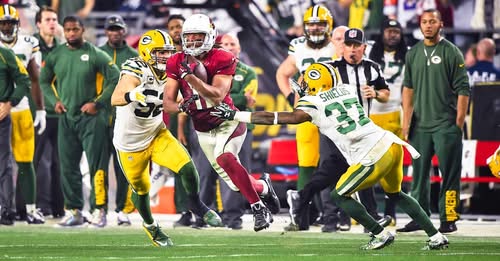There are few certainties in life: death, taxes, and Larry Fitzgerald catching everything thrown his way. Now, just a few years removed from his final NFL snap, Fitzgerald finds himself standing on the doorstep of football immortality. The 11-time Pro Bowler and one of the most respected players in league history is poised to take the next step in his legendary career—toward enshrinement in the Pro Football Hall of Fame in Canton, Ohio.
Fitzgerald’s numbers speak for themselves. He ranks second all-time in NFL history in both receptions (1,432) and receiving yards (17,492), trailing only the indomitable Jerry Rice in each category. With 121 career touchdown receptions to his name, Fitzgerald is also among the top scorers in NFL history. But statistics alone don’t capture the essence of Fitzgerald’s greatness. They can’t fully tell the story of a player who defined excellence, humility, and loyalty over 17 incredible seasons—all with a single franchise: the Arizona Cardinals.
When Fitzgerald was selected with the third overall pick in the 2004 NFL Draft out of the University of Pittsburgh, expectations were sky-high. Still, few could have predicted the consistency and impact he would deliver across nearly two decades in a league that routinely devours careers with ruthless efficiency. His route-running was a masterclass in precision. His hands were as reliable as any in football history. And his presence in the locker room was that of a true professional—quiet yet commanding, humble yet legendary.
Fitzgerald’s longevity was unprecedented. In an era when wide receivers often fade after their early 30s, he remained a premier option well into his mid-30s. Even more impressive was the fact that he did it while catching passes from a rotating cast of quarterbacks—21 different signal-callers, to be exact. From Josh McCown to Kurt Warner to Carson Palmer and a rookie Kyler Murray, Fitzgerald never complained. He never pointed fingers. He just did his job. Always. Without fail.
It’s not just the catches that define Fitzgerald’s legacy—it’s the timing and the stakes. In the 2008 playoffs, Fitzgerald turned in one of the greatest postseason performances the league has ever seen. He racked up 546 yards and seven touchdowns in just four games, leading the Cardinals to their first Super Bowl appearance in franchise history. In Super Bowl XLIII against the Pittsburgh Steelers, Fitzgerald caught seven passes for 127 yards and two touchdowns, including a breathtaking 64-yard catch-and-run with under three minutes remaining to give Arizona a late lead. Though the Cardinals ultimately fell to Pittsburgh in heartbreaking fashion, Fitzgerald’s heroics were etched into the annals of Super Bowl lore.
That postseason run showcased not just Fitzgerald’s skill, but his heart. He was the ultimate competitor, elevating his game when it mattered most. And yet, through the accolades and highlight-reel moments, he remained refreshingly grounded. Fitzgerald never sought attention, never engaged in the antics that often follow superstardom. Instead, he let his play do the talking.
Even off the field, Fitzgerald operated with a grace and dignity that made him a role model far beyond the gridiron. His work in the community has been just as impactful as his career on the field. He founded The Larry Fitzgerald Foundation, dedicated to promoting literacy and cancer research—causes close to his heart after losing his mother to breast cancer in 2003. His charitable efforts have raised millions, and his example has influenced countless athletes to use their platform for good.
Fitzgerald was also a consummate ambassador for the game of football. He represented the NFL with class, both domestically and abroad. Whether mentoring young players or serving on the NFL’s Player Advisory Council, he was deeply invested in the league’s future. He didn’t just want to be great—he wanted to leave the game better than he found it.
And yet, despite all his contributions and accolades, Fitzgerald never won a Super Bowl. For some, that would be a glaring omission on their resume. For Fitzgerald, it was just part of the journey. He never let the absence of a ring define him. In fact, his ability to maintain such a high standard of excellence over 17 years with only a few true Super Bowl-caliber teams is perhaps the strongest testament to his greatness. He didn’t need a championship to validate his career—his work ethic, production, and character did that already.
Now, as he becomes eligible for induction into the Hall of Fame, the conversation isn’t whether he will be enshrined—it’s how quickly the voters will make it unanimous. If Fitzgerald doesn’t make it in as a first-ballot Hall of Famer, then the system itself is broken. He’s the very definition of what Canton represents: excellence, integrity, and a lasting impact on the game.
Fitzgerald’s induction will also mark the continuation of a golden age of receivers entering the Hall. In recent years, names like Randy Moss, Calvin Johnson, and Torry Holt have joined the ranks. But even among these titans, Fitzgerald’s career stands out for its durability, consistency, and leadership. He wasn’t the fastest or flashiest. He wasn’t the loudest or most outspoken. But he was, year after year, the most dependable. In a league full of chaos, Fitzgerald was a constant.
He also redefined what it meant to be a wide receiver in the modern NFL. While so many others relied on sheer athleticism or highlight catches, Fitzgerald was a technician. He was surgical in how he attacked defenders. He studied film obsessively, understood coverages deeply, and executed routes with machine-like precision. That cerebral approach extended to every part of his career—how he trained, how he recovered, how he prepared for each game as if it were his last.
And then there was his loyalty to Arizona. In an era of player movement and ring-chasing, Fitzgerald’s commitment to one franchise became a badge of honor. He never demanded a trade, even during lean years. He never put himself above the team, even when he could have. He was, in every sense, the face of the Cardinals—not just for a few years, but for nearly two decades.
That loyalty earned him the respect of teammates, opponents, and fans alike. Few players in NFL history have been as universally admired as Fitzgerald. Coaches raved about his preparation. Defensive backs respected his toughness and precision. Reporters praised his professionalism. Fans, even those outside of Arizona, found in Fitzgerald a rare figure who transcended rivalry and became a symbol of what sports can represent at their best.
There’s a certain poetry to Fitzgerald’s journey. The son of a sports journalist, he grew up in Minnesota idolizing Jerry Rice. He served as a ball boy for the Minnesota Vikings, watching greats like Cris Carter and Randy Moss up close. Years later, he would surpass Carter and Moss in several statistical categories and etch his name alongside Rice in the record books. From ball boy to Hall of Famer—few stories in football are as compelling or as complete.
When the inevitable announcement comes and Fitzgerald is officially named a Hall of Fame inductee, it won’t just be a celebration of numbers. It will be a celebration of a player who did everything the right way. It will be a reminder that greatness doesn’t always have to be loud or self-promoting. Sometimes, greatness is quiet. Sometimes, it shows up to work every day, puts its head down, and just delivers.
Fitzgerald once said, “Legacy is not what you do on the field. It’s what you do off the field, and how you affect people’s lives.” By that measure, he may be the most successful player of his generation. His impact extends far beyond touchdowns and trophies. It lives in the scholarships his foundation has funded. It echoes in the lives of the cancer patients he’s supported. It resounds in the younger players he’s mentored, many of whom now carry forward his example.
As the football world prepares to welcome Larry Fitzgerald into its most exclusive fraternity, the feeling is not just one of admiration—it’s one of gratitude. Gratitude for the plays, for the professionalism, and for the example he set. Canton isn’t just Fitzgerald’s next stop. It’s where his story becomes eternal.
For Cardinals fans, the Hall of Fame ceremony will serve as both a celebration and a farewell. It’s a chance to look back on the joy, the grace, and the elegance of No. 11. For the rest of us, it’s a reminder that in a sport built on chaos and collision, there was once a player who brought order and purpose to every route, every snap, every game.
In a career defined by class and consistency, Larry Fitzgerald now takes his rightful place among football’s legends. He didn’t just play the game—he honored it. And now, the game will honor him back.



